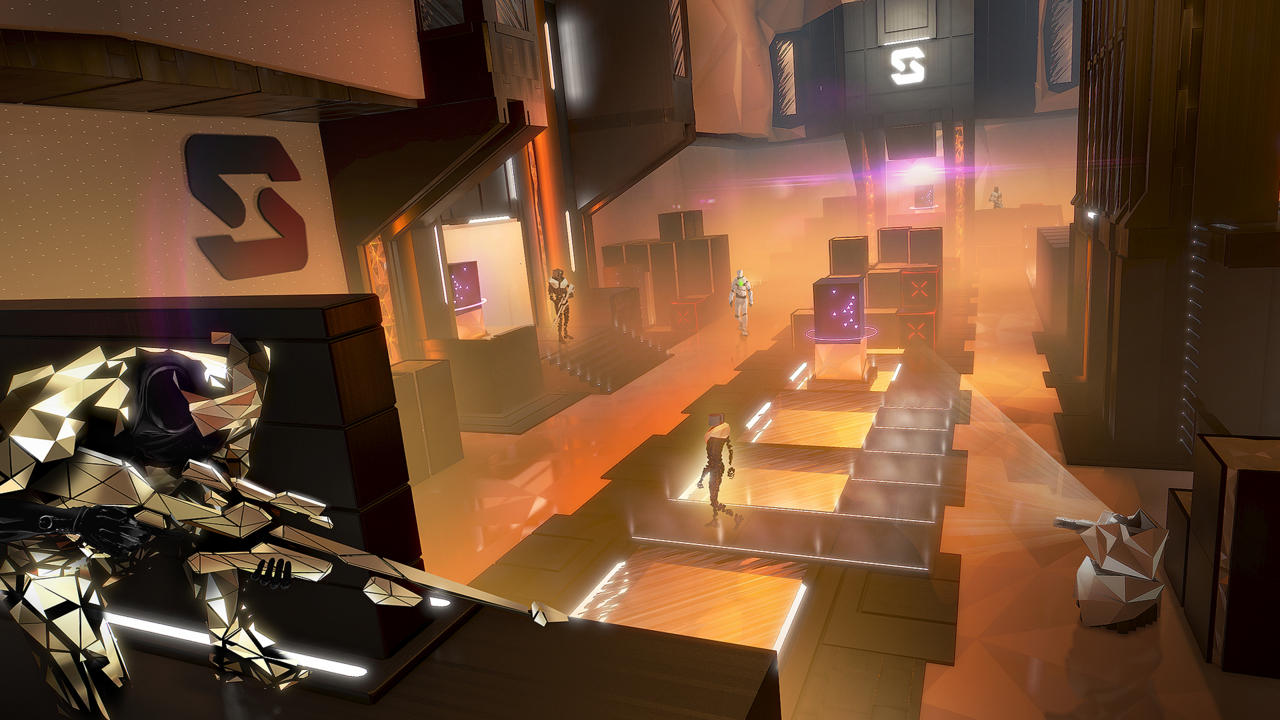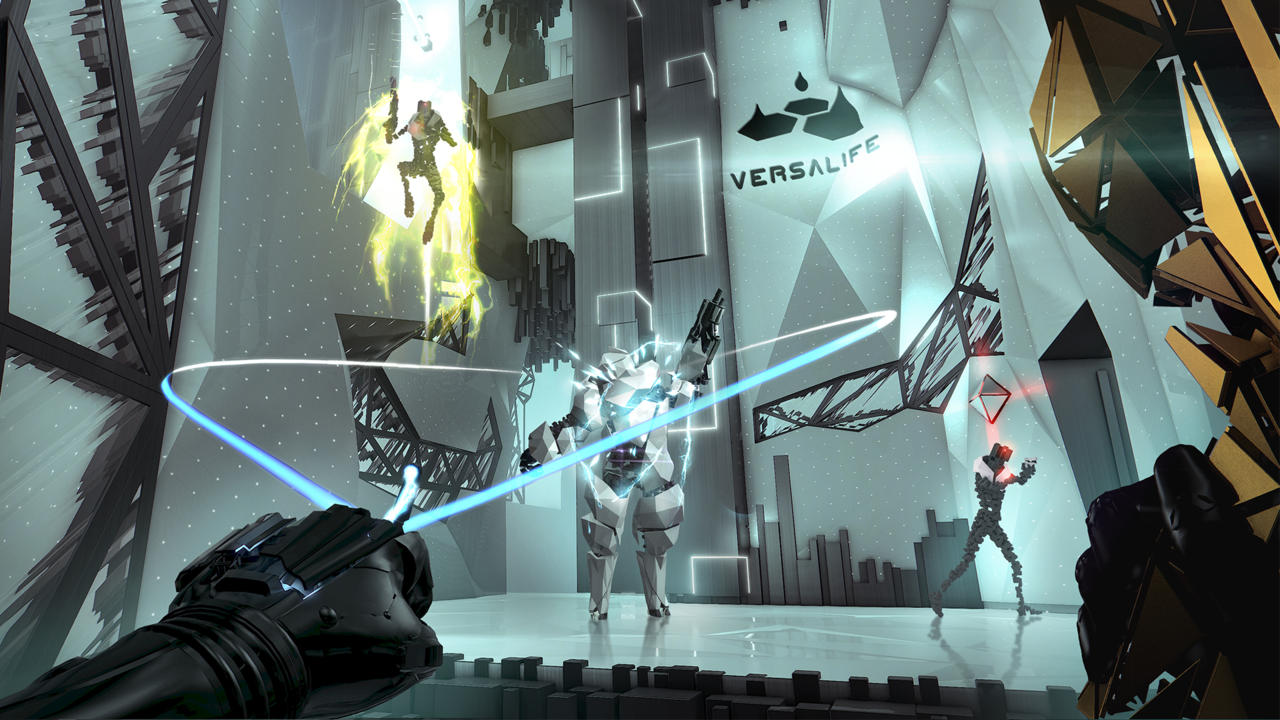How much choice is too much? From the two or so hours that I spent with the latest build of Deus Ex: Mankind Divided, what struck me was how virtually every mission could be approached however I wanted. I could hack, I could sneak, I could distract, I could loot, I could play the peacekeeping diplomat, I could embark on a rampage if I sought that electrifying rush of sin.
That degree of choice is welcome when plotting your next steps, but it comes at a price. Mankind Divided stacks together gameplay ideas that, quite often, don’t sit well with one another. Hug a filing cabinet for makeshift cover, for example, and a cluster of vectors will open up, each offering a different action to ponder: You can slide around the cabinet's corner, or leap to another nearby cover point, or plot the path for a stealth roadie-run, or shoot from cover, or indeed search the cabinet. It's as though you just stepped on a UI landmine.

Which is why the never-before-seen Breach mode caught my interest and, ultimately, resonated better with me. This standalone mode offers a significant departure from the main campaign, to the extent that I wouldn't have been shocked if publisher Square Enix released it as its own game under a different name. Here you are thrown into what best resembles a test chamber, usually with a handful of rooms connected by a corridor or two, with a simple goal: locate several servers dotted around each level and activate them, then return to your spawn point before the countdown timer reaches zero.
It's a basic and lightweight set-up, resembling something akin to a first-person assault course, with many of its levels no bigger than a family home. Challenges can usually be finished on first attempt in five minutes or less, and I suspect the best speedrunners will eventually be able to master some maps in less than 10 seconds.
But it’s the tension that really sells it. Whereas Mankind Divided's main campaign trades on freedom and choice, Breach mode plays on decisiveness and pressure. It’s a futuristic data heist, as thrilling as (one presumes) breaking into the vault at the depths of a commercial bank.
As soon as you activate enough of each level’s servers, the security system enters panic mode and attempts to lock you in, usually with just a minute or so ticking on a countdown clock.
"We had all these amazing core gameplay systems, and we felt there was an opportunity to extract it from all the real-world elements."
Fleur Marty, Deus Ex live team producer
There is a wonderfully tantalising twist during the lockdown process, because not all of the servers will be activated yet. That creates the dilemma: do you escape with your bounty or go for glory and delve deeper into each level?
Fleur Marty, producer for the Deus Ex live team, said there was a desire at the studio to take a holiday from the complexities of the main game. "It came to us that we had all these amazing core gameplay systems, and we felt there was an opportunity to extract it from all the real-world elements,” she tells GameSpot.
“The realism of Mankind Divided feeds into everything, including level design, because everything has to be so credible. The buildings have to be structured in a way that seems lifelike. So we thought, 'Let's just take those gameplay pillars and put them in a very fun environment.'"
Which explains why Breach is such a visual and thematic departure from the main game. The servers you find are Space Odyssey-style monoliths (picture a door made of coal and you're close), while your hero and enemies are humanoid clusters of polygons. You are not Adam Jensen and this is not a cyberpunk city to navigate. Its test chambers are abstract caves, intentionally angular and basic, washed in simple colours and impossibly clean hallways.
That abandonment from realism allows Breach mode to be more playful with its laws and logic. Quite fiendishly, the structure of some levels morph during lockdown, meaning you will know roughly how to get home, but not quite trust that the route will be straightforward. Dashing back to the exit with just ten seconds to spare, only to find the door is now bricked-in, is as exhilarating as it is stressful.
Obstructing both infiltration and escape is a host of sentinels, drones, turrets, and later, the more powerful Prime guards. Generally these are rudimentary AI foes, easy to melee or shoot down on their own, but with the margin for error so thin during lockdowns, they are hardly a bubble bath.

There are puzzle elements too; some servers are hidden behind fake walls and secret doors, while others hang above you on what initially appears to be inaccessible platforms. Due to the abstract visuals of Breach mode, it's a challenge to understand how to navigate the space; you won't find any nearby wooden ladders or open windows.
Marty says Breach mode became visually distinct quite gradually: "When we started, we had the very simplistic, stylised environment, but elements we added, like the turrets and the cameras, were realistic models, so we thought, oh that looks weird now, we should change that. So the more we changed, the more we felt we needed to change."
Breach mode has also been created with a pronounced time-trial and hi-score element. Strings of kills and other feats will boost a score multiplier, as will unlocking all the servers. Players can challenge others to beat their score, and I suspect it was this social element that was a key reason why Breach was added to Mankind Divided. It is rare for a modern premium triple-A game to not feature a standard multiplayer component, and while Mankind Divided still lacks one, Breach mode does resemble a solution.
Whereas Mankind Divided's main campaign trades on freedom and choice, Breach mode plays on decisiveness and pressure.
"We were all thinking, sure, it would be cool to have a multiplayer, but really, what is a multiplayer Deus Ex? It feels weird. So that's why we have built something more asynchronous," Marty says.
What’s so impressive is the focus in which the game pulls you in opposite directions. Run through the level as fast as possible, but don’t get spotted. Activate as many servers as possible, but don’t stray too far from your exit point. You will usually be making these key decisions, of how far you can go without compromising yourself, in split seconds.
"Each map also has a par time to try and beat,” Marty explains. “On some maps you're going to see it and think, no way, that's just not possible. You're going to see par times of nine seconds on maps that took you five minutes.
"We want players to break our systems. I remember the level designer finding out that one of our programmers had completed this level in nine seconds. He couldn't believe it.”
I’m also told that players will be able to challenge their friends, waging points that they won’t be able to beat a certain score or time. It’s another social element that seems interesting on paper, but hard to measure until the game is at the mercy of its community.
For all its unknowns, there is one aspect to Breach that is guaranteed: people are going to dislike the microtransactions. Ammo and health are commodities you won’t usually find lying around in each level; instead your score is converted into currency that can be used to buy booster packs of five cards (Marty admits that many on the team are big Hearthstone fans). Each card could unlock a weapon, or upgrades, skills, health, ammo, and so on. More expensive packs provide rarer items. To give you a sense of the grind, after the end of the first mission I had 4,500 credits. A standard pack is 6,000 credits, special ammo pack 6,000 credits, modifier pack is 12,000 credits, enhancer pack is 15,000 credits, and an elite pack is 50,000 credits.

Booster packs, as you may have guessed, can also be bought with hard currency. The more you pay, the better chance you have of getting what you want, according to Marty.
“You can play the full game without ever having to spend a dollar, I promise," she says, "but we will have a few accelerators, things like putting odds a bit better in your favour."
Marty agrees it’s hard to draw the line between enticing players to pay whilst not discouraging those who simply won’t. If Hearthstone is the tolerable grey area between pay-to-win and free-to-play, she says Breach needs to lean towards the latter.
“We're aiming for lighter than Hearthstone, because that's free-to-play, which we're not. We're a premium triple-A game. It's a lot of testing to get it right. We're really treading very carefully here. We don't want the game to be pay to win, especially since we're starting with a triple-A game that people are already paying for.”
Breach mode does, in my opinion, feature ideas which are a little more obviously pay-to-win. As Marty explains: “We also have this thing where, if you're incredibly close to finishing a map, but die, you can spend a bit of hard currency to revive.”
How much microtransactions weigh down Breach mode remains to be seen. But judging by the first hour I played, the fundamentals are certainly in place. For all the excesses and depth of Mankind Divided, the retreat to quick-fire arcade mode, one which you can play with friends, is a welcome addition to the package as a whole.
Deus Ex: Mankind Divided releases on August 23 across Xbox One, PlayStation 4, and PC.

